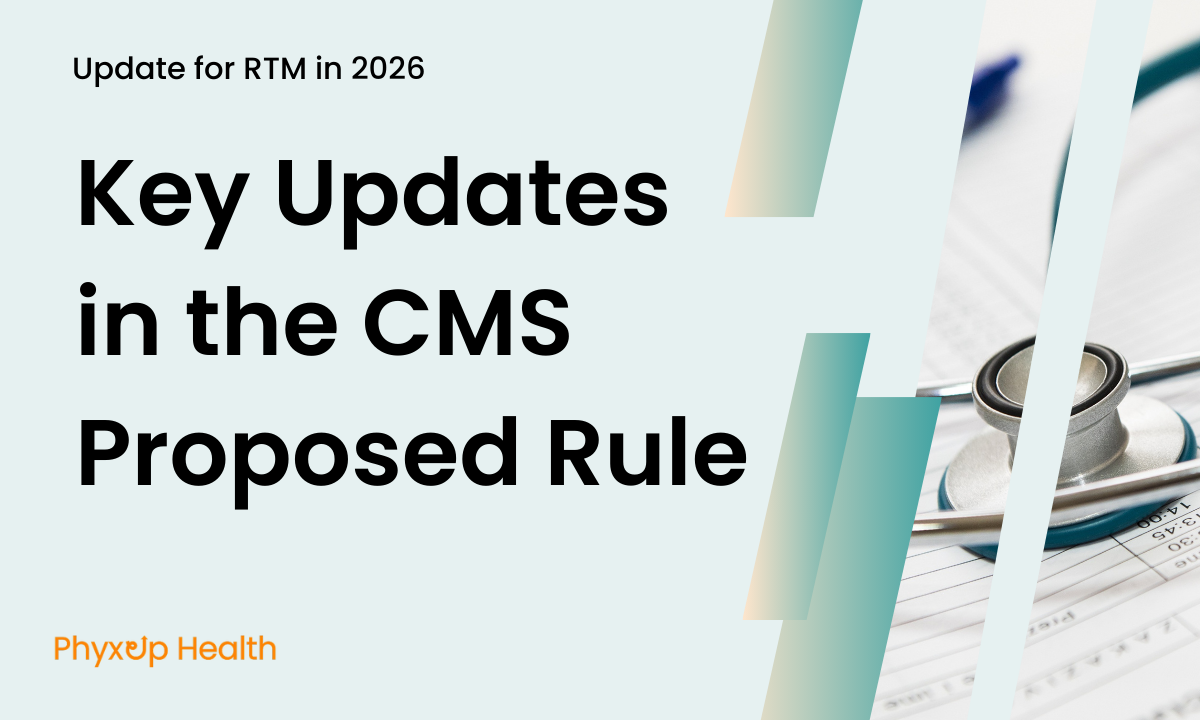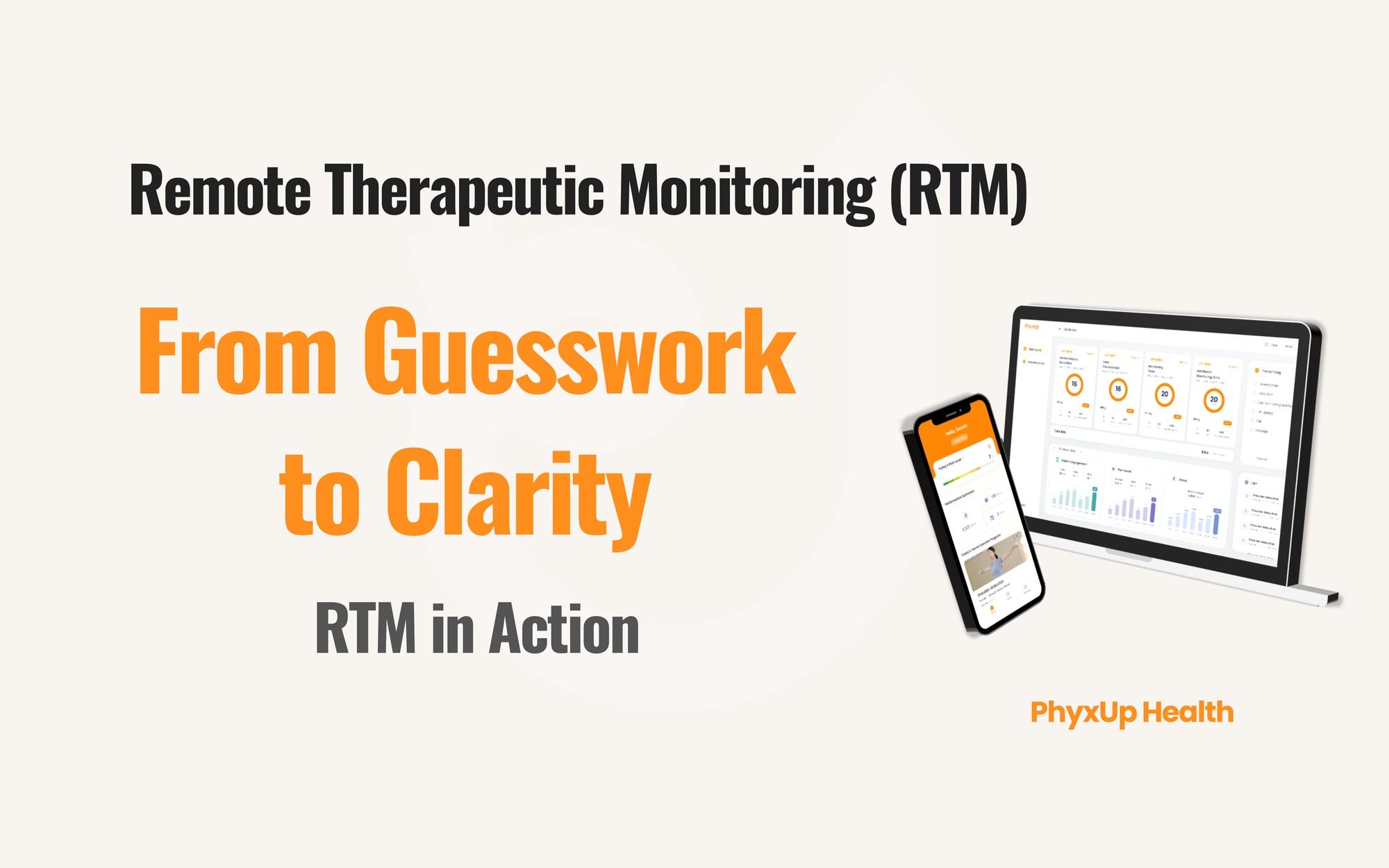Updates for RTM in 2026: Key Changes in the CMS Proposed Rule

On July 14, 2025, the Centers for Medicare & Medicaid Services (CMS) released its proposed Medicare Physician Fee Schedule (PFS) for 2026. A key part of the proposal includes important changes to Remote Therapeutic Monitoring (RTM), such as new CPT codes and expanded reimbursement options. These updates could affect how providers deliver care and get paid in the coming year.
Two New MSK RTM Codes Proposed:
Starting January 1, 2026, CMS plans to add two new CPT codes to the musculoskeletal (MSK) RTM code set:
2️⃣ 10–19 minutes of monthly treatment management services for RTM patients (98979)
🔮 The Future of RTM in 2026
These proposals signal CMS’s willingness to provide long-term support for RTM by expanding reimbursement options and encouraging broader adoption of technology-driven care for patients with musculoskeletal conditions.
📊 Understanding CPT 98985
CPT 98985 allows billing for an RTM device that monitors musculoskeletal (MSK) system status with 2 to 15 days of patient-generated data within a 30-day period.
2026 Payment Rates
- APM Qualifying: $40.28
- Non-APM Qualifying: $40.08
Why CPT 98985 Matters in Your RTM Workflow
Previously, if a patient didn’t reach the 16-day data transmission threshold required for CPT 98977, you couldn’t bill at all, even if they submitted 14 days of data. This meant lost revenue and wasted engagement efforts.
With CPT 98985, the threshold is significantly lower:
You can now bill for data transmission starting at just 2 days.
This creates flexibility for:
- Patients with irregular engagement
- Shorter treatment episodes
- Seasonal or transitional care periods
- On-again/off-again compliance cases
⏰ Understanding CPT 98979
CPT 98979 allows billing for 10-19 minutes of monitoring time, provided there is at least one real-time, interactive communication with the patient or caregiver during a 30-day period.
2026 Payment Rates
- APM Qualifying: $39.97
- Non-APM Qualifying: $39.77
Why CPT 98979 Matters in Your RTM Workflow
Currently, billing for monitoring time begins only when a clinician reaches 20 minutes of RTM monitoring, which qualifies for reimbursement under 98980. This means that any time spent monitoring below that threshold simply isn’t billable.
However, 98979 changes this as the time requirement is reduced to just 10 minutes, allowing you to bill earlier and more frequently. This provides reimbursement for shorter monitoring intervals.
Here's how the workflow looks for 17 minutes of monitoring over a 30 day period:
- First 10-19 minutes of monitoring time: 98979
Total amount billed: $39.97
Proposed 2026 Conversion Factor Updates:
CMS is also proposing an increase in the Medicare conversion factor, which determines how much providers are paid for each service.
Key Highlights:
- Two Separate Conversion Factors (Required by Statute) – Starting in 2026:
- Qualifying Alternative Payment Model (APM) participants: +0.75%
- Non-qualifying APM physicians/practitioners: +0.25%
- Legislative Adjustment – A one-year increase of +2.5% for 2026.
- Work RVU Adjustment – An estimated +0.55% increase tied to proposed changes in work RVUs for certain services.
Proposed 2026 Conversion Factors:
- Qualifying APM: $33.59 (+3.83% vs. 2025)
- Non-qualifying APM: $33.42 (+3.62% vs. 2025)
Projected Changes in Payments:
| CPT Code | 2025 Avg. Payment | 2026 Payment (non APM-Qualifying) |
2026 Payment (APM-Qualifying) |
|---|---|---|---|
| 98975 | $19.73 | $21.72 |
$21.83 |
| 98977 | $43.02 |
$39.77 |
$39.97 |
| 98979 (NEW) | N/A | $39.77 | $39.97 |
| 98985 (NEW) | N/A | $26.07 | $26.2 |
| 98980 | $50.14 | $53.81 | $54.08 |
| 98981 | $39.14 | $41.11 | $41.32 |
🔍 What does this mean for your Practice?
These changes offer new opportunities and greater financial stability for practices using RTM, such as:
- New billing opportunities: You can now be reimbursed for shorter device usage periods and less time-intensive care
- Greater flexibility: Reimbursement is possible even when patients don’t meet the full 16-day threshold
- Real-world alignment: Recognizes that not all patients need extensive monthly monitoring
- Support for better outcomes: Supports earlier interventions and personalized treatment
- Increased revenue: Higher conversion factors translate to better reimbursement

🚀 Why PhyxUp Health Is Ready to Help
PhyxUp Health is built to help providers stay ahead of policy changes. We make it easier to deliver and bill for RTM services, especially for musculoskeletal care.
Why PhyxUp stands out:
- Purpose-Built for RTM in MSK Care: PhyxUp Health was designed specifically to support musculoskeletal care delivery, making it an ideal fit for the newly proposed MSK RTM codes (98985 and 98979)
- Regulatory Readiness: Our product and clinical operations teams closely monitor CMS updates and adjust our system accordingly
- Scalable Infrastructure: Whether you're a single clinic or a multi-location health system, PhyxUp Health's platform is ready to scale
- Built for Value-Based Care: With the rise of APMs and increasing emphasis on outcomes, PhyxUp Health is not just a compliance tool—it’s a partner in driving better clinical results
- Proven Value: Our partners consistently report improved reimbursement capture and reduced documentation burden—key outcomes in a climate where CMS is increasing incentives for digital monitoring and clinician-patient communication
As CMS paves the way for broader RTM adoption, PhyxUp Health is ready to empower providers to lead the future of value-driven, tech-enabled musculoskeletal care.

